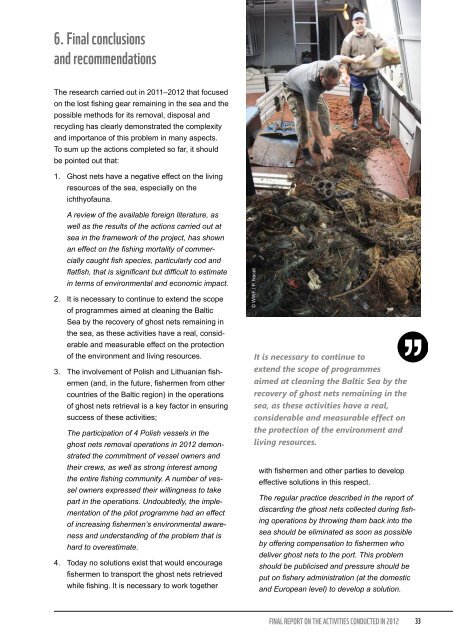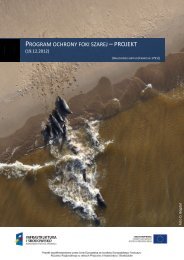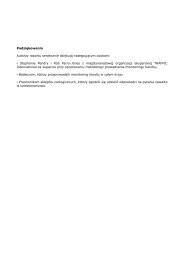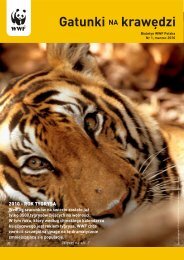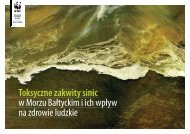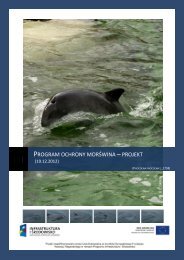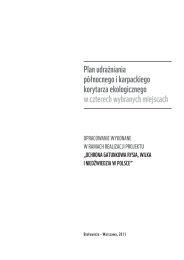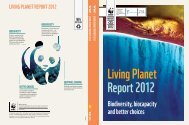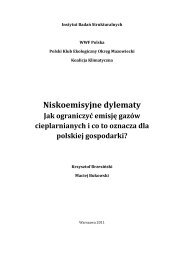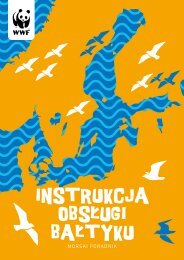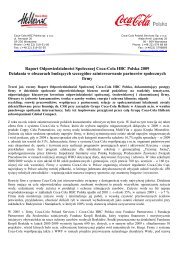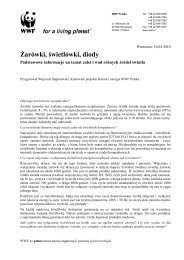COLLECTING GHOST NETS IN THE BALTIC SEA - WWF
COLLECTING GHOST NETS IN THE BALTIC SEA - WWF
COLLECTING GHOST NETS IN THE BALTIC SEA - WWF
You also want an ePaper? Increase the reach of your titles
YUMPU automatically turns print PDFs into web optimized ePapers that Google loves.
6. Final conclusions<br />
and recommendations<br />
The research carried out in 2011–2012 that focused<br />
on the lost fishing gear remaining in the sea and the<br />
possible methods for its removal, disposal and<br />
recycling has clearly demonstrated the complexity<br />
and importance of this problem in many aspects.<br />
To sum up the actions completed so far, it should<br />
be pointed out that:<br />
1. Ghost nets have a negative effect on the living<br />
resources of the sea, especially on the<br />
ichthyofauna.<br />
A review of the available foreign literature, as<br />
well as the results of the actions carried out at<br />
sea in the framework of the project, has shown<br />
an effect on the fishing mortality of commercially<br />
caught fish species, particularly cod and<br />
flatfish, that is significant but difficult to estimate<br />
in terms of environmental and economic impact.<br />
2. It is necessary to continue to extend the scope<br />
of programmes aimed at cleaning the Baltic<br />
Sea by the recovery of ghost nets remaining in<br />
the sea, as these activities have a real, considerable<br />
and measurable effect on the protection<br />
of the environment and living resources.<br />
3. The involvement of Polish and Lithuanian fishermen<br />
(and, in the future, fishermen from other<br />
countries of the Baltic region) in the operations<br />
of ghost nets retrieval is a key factor in ensuring<br />
success of these activities;<br />
The participation of 4 Polish vessels in the<br />
ghost nets removal operations in 2012 demonstrated<br />
the commitment of vessel owners and<br />
their crews, as well as strong interest among<br />
the entire fishing community. A number of vessel<br />
owners expressed their willingness to take<br />
part in the operations. Undoubtedly, the implementation<br />
of the pilot programme had an effect<br />
of increasing fishermen’s environmental awareness<br />
and understanding of the problem that is<br />
hard to overestimate.<br />
4. Today no solutions exist that would encourage<br />
fishermen to transport the ghost nets retrieved<br />
while fishing. It is necessary to work together<br />
© <strong>WWF</strong> / P. Necel<br />
It is necessary to continue to<br />
extend the scope of programmes<br />
aimed at cleaning the Baltic Sea by the<br />
recovery of ghost nets remaining in the<br />
sea, as these activities have a real,<br />
considerable and measurable effect on<br />
the protection of the environment and<br />
living resources.<br />
with fishermen and other parties to develop<br />
effective solutions in this respect.<br />
The regular practice described in the report of<br />
discarding the ghost nets collected during fishing<br />
operations by throwing them back into the<br />
sea should be eliminated as soon as possible<br />
by offering compensation to fishermen who<br />
deliver ghost nets to the port. This problem<br />
should be publicised and pressure should be<br />
put on fishery administration (at the domestic<br />
and European level) to develop a solution.<br />
F<strong>IN</strong>AL REPORT ON <strong>THE</strong> ACTIVITIES CONDUCTED <strong>IN</strong> 2012<br />
33


